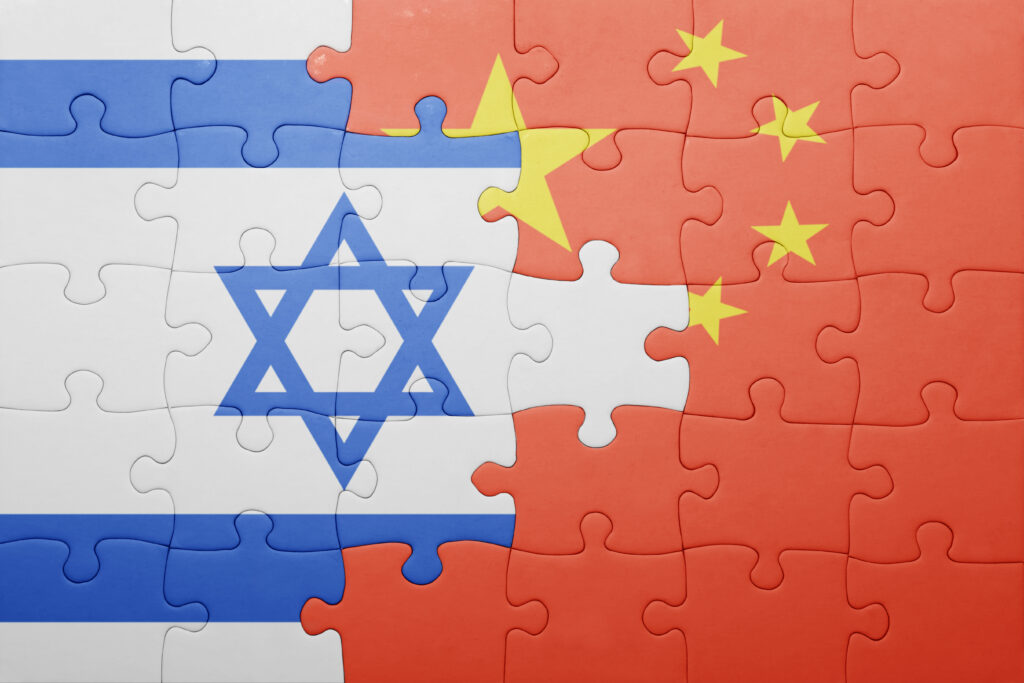Australia/Israel Review
Asia Watch: Balancing Act
Feb 25, 2025 | Michael Shannon

US President Donald Trump’s bold proposal to transfer Palestinians out of Gaza and have the US take over the region sent shockwaves through the Middle East, highlighting how distant countries still hold huge sway in the region.
The globe’s other main superpower – China – is less given to shock announcements or colourful rhetoric. While Foreign Ministry spokesperson Guo Jiakun said, “Gaza is the Gaza of Palestinians, an integral part of the Palestinian territory, not a political bargaining chip,” the official Chinese position, restated in a position paper in late 2023, calls for a two-state resolution.
The ongoing role of China in the region, and particularly its relationship with Israel, remains a paradox – marked by economic pragmatism and calculated realpolitik.
China’s response to Hamas’ murderous October 7 attacks conspicuously avoided condemning Hamas, let alone recognising Hamas as a terrorist organisation, but was quick to accuse Israel of overreacting in Gaza. Meanwhile, a surge in antisemitic and anti-Zionist content emanated from Chinese state media, diplomats, online influencers and academia.
Furthermore, Beijing’s continued warm relations with Iran, its high-profile diplomatic successes in late 2023 normalising ties between Iran and Saudi Arabia, which had been on the brink of normalising ties with Israel before the war, and its attempt to reconcile the Palestinian factions in the “Beijing Declaration” of July 2024, led to Israel expressing “deep disappointment” over China’s position.
Further complicating matters, reports emerged in late 2023 that Israeli high-tech industries were experiencing difficulties importing components from China due to bureaucratic obstacles. These challenges led to increased costs and delays, which some Israeli officials interpreted as de facto sanctions by China amidst the ongoing conflict.
Israel’s closeness to the United States seems to be a critical factor. After it became clear that most of the Global South has turned against Israel once the Gaza war started, China saw an opportunity. Support for Palestine is seen as having boosted China’s image in the developing world – one of Beijing’s main audiences – while also working to undermine US standing abroad and theoretically tilt the global power balance in its favour.
However, Beijing’s position has evolved in step with Israel’s military gains. Its vocal support for the Palestinian cause appears to have tempered, in a calculated shift of geopolitical priorities. Since the ceasefire, China has maintained its earlier call for restraint and dialogue, while its shuttle diplomacy is back on display: Zhan Jun, China’s top envoy, recently visited Israel and the Palestinian Territories, marking the first such trip since the outbreak of war in October 2023.
During talks in Israel, Zhan Jun applauded the ceasefire and emphasised the importance of hostage-release agreements, and spoke of greater Sino-Israeli collaboration. In discussions with Palestinian leaders in Ramallah, he reiterated China’s longstanding support of Palestinian self-determination and the “two-state solution”.
Meanwhile, the fluctuating diplomatic relationship has not prevented deepening economic ties between the two countries. Over the past year, bilateral trade has reportedly increased by approximately 12%, reaching an estimated $15 billion (A$22.6b) in overall trade volume. Chinese investments in Israel’s tech sector have surged, enabling start-ups to scale their operations and further integrate into global markets. Concurrently, Israeli companies have found new opportunities in the expansive Chinese market, especially in sectors such as cybersecurity, water technology and renewable energy.
Although each country pursues its own strategic interests, each has clearly benefitted from a partnership that combines Israel’s cutting-edge innovations with China’s vast manufacturing capabilities and market access.
While China is now Israel’s third-largest trading partner globally, the expanding economic relationship is complicated. Israel’s deep-rooted strategic alliance with the United States necessitates a level of caution in its dealings with Beijing. Washington has repeatedly expressed concerns over technology transfers and the potential for security breaches resulting from Chinese infrastructure developments.
For instance, in 2021 Chinese company Shanghai International Port Group (SIPG) began its 25-year contract to build and operate Israel’s Haifa commercial shipping port. Washington expressed concern that the port lies adjacent to the Israeli naval base where ships of the US Sixth Fleet frequently dock, although after four years of operation these concerns have been allayed.
Still, Israel continues its delicate balancing act: reaping the benefits of Chinese investments and technological collaborations while not jeopardising its crucial ties with the US.
Tags: China, Israel, Middle East, Palestinians






